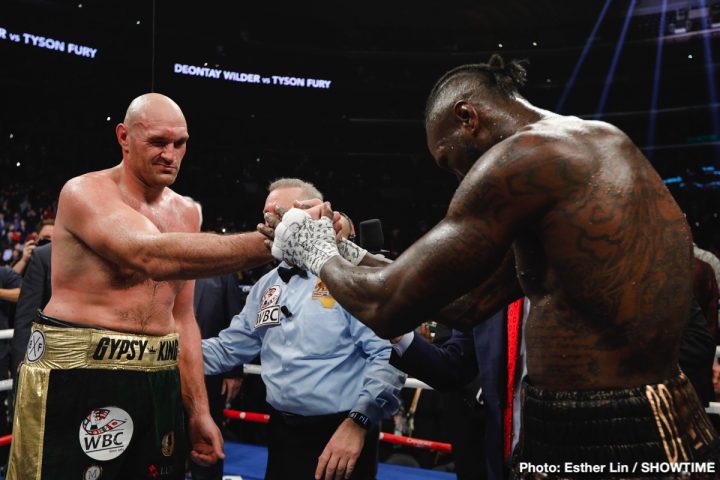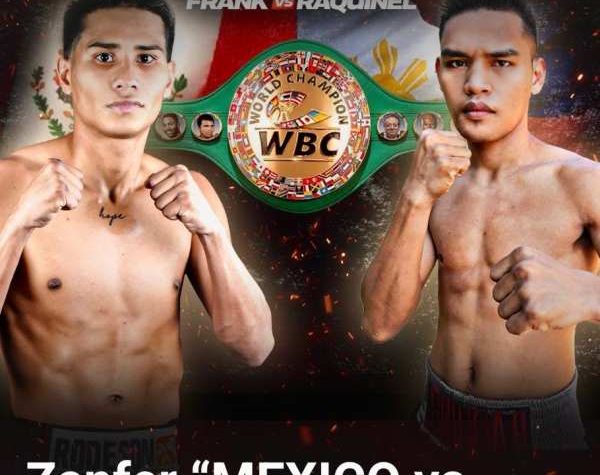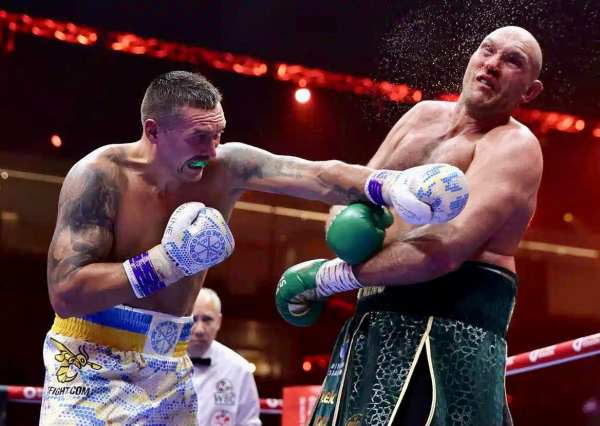
By Joseph Hirsch – Joehirs123@aol.com – How many boxing matches do you know of offhand that spark debates about religion in the aftermath? Some of the postmortem on Deontay Wilder versus Tyson Fury was tongue-in-cheek, as when welterweight kingpin Errol Spence claimed Fury’s unreal recovery in the twelfth round was some “gypsy sh**” caused by someone in his camp using a doll to wake Tyson up and beat the count, or when promoter Lou DiBella compared Fury’s twelfth round resurrection to something we’re more accustomed to seeing from someone like the WWE’s Undertaker.
Some of the other post-fight chatter, like that of legendary trainer Freddie Roach, seemed a bit more serious. Talking about the same knockdown as “The Truth” (and everyone else in the aftermath of the fight), Freddie merely shrugged in that way of his and said, “Maybe there’s a God.”
It’s not my job as a sportswriter to make such speculations, but one thing is certainly true now: the heavyweight division has a couple of bonified demigods, true titans in Tyson “the Gypsy King” Fury and Deontay “the Bronze Bomber” Wilder.
Some boxing fans can never be pleased and both Tyson Fury and Deontay Wilder will always have their contingent of detractors and haters (especially Wilder). To address the criticism of each man in their turn, let’s start with Fury, who’s not noted for his KO pop: Before you criticize Fury for his lack of power, ask yourself how many men have managed to swell Deontay Wilder’s eye shut in recent memory?
The boogeyman of the Division, Luis “King Kong” Ortiz certainly buzzed Wilder (and there are still some fans who maintain Wilder would have lost that fight without the benefit of a generous ref giving him time to recover) but in the post-fight conference Wilder’s face was as fresh as if he’d sparred three rounds with 16 ounce gloves.
Tyson Fury didn’t do a demolition job on Wilder, but he did have enough pop and technique (besides his brilliant feints and headwork) to make the other man respect him and become a bit gun-shy at times. He also managed to wobble Wilder multiple times. To press his advantage and go for the knockout (while risking getting KO’d himself) is just not the modus operandi of a pure boxer like Tyson Fury, but the potential for a Fury KO was there.
Wilder, for his part, is still denigrated by a large part of boxing fandom (especially in Britain) who maintain he’s essentially a tough man with a large right hand and nothing else, a “lottery winner,” as someone once said disrespectfully of Hasim Rahman. The problem with this is that Deontay Wilder actually fell for fewer feints and managed to become less flustered by Tyson Fury than the great, long-reigning heavyweight champion Wladimir Klitschko. Some say that the Tyson Fury who showed up in Dusseldorf to beat Dr. Steelhammer was a better version of the “Gypsy King,” than the one Wilder got, but my personal take is that these people are looking at the body, the extra stone (fourteen pounds) and not at the intangibles brought to the table. I believe Tyson Fury should be taken at his word when he says that old Fury is dead, and that the new one is new and improved, which makes those two knockdowns Wilder scored all the more credible.
What was most impressive about Deontay Wilder’s performance (in a fight I had him narrowly losing) was that he didn’t lose his poise, that even when loading up on his right hand, he didn’t do what Al Bernstein once called the “Marlon Brando impression” banging his gloves together, huffing and puffing, or punching himself in the face to stoke himself up (a la Ricardo Mayorga or Arthur “King” Abraham).
Fighting Tyson Fury has to be one of the most frustrating experiences in the world (aside from having to deal with Tyson Fury at a press conference). Yes, Wilder looked for that one shot all night, but there was much less of his much maligned “wind-milling” in evidence in this fight than in the early days, and while he still uses a straight-arm left (technically illegal, though Jack Reiss didn’t penalize him on it), to prime the big right hand, he’s nowhere near as obvious about loading up with the dynamite as he was in the past.
And if Deontay Wilder is really the most obvious, one-dimensional fighter that his harshest critics claim, then how did he manage to plant Tyson Fury on the canvas in the twelfth round, considering Fury is perhaps the slipperiest heavyweight to ever live? Size-wise Fury is near the “Beast from the East” Nikolai Valuev, but he has a grace, the limber unorthodox dancing style of the old underrated Emanuel Augusts Burton, the “Drunken Master” who employed what Teddy Atlas used to call the “puppet style.” Tyson didn’t get careless and get caught; Tyson was switched on and still got tagged.
Yes, Deontay Wilder still has room for improvement, and no doubt feels he still has much to prove, but he has proven so far that he can improve and adjust, and get better with time. Most late-bloomers who come to boxing usually show such deficiencies. There are some notable exceptions, like Sergio “Maravilla” Martinez, who picked up boxing late and yet took to it like a duck to water, but his is a rare counterexample. Deontay Wilder is also not the only man to make it to world level while still lacking in a couple of dimensions. There were other champions before Wilder who remained rough around the edges and lacking in fundamentals even in their title reigns. See Chris “Simply the Best” Eubank, for an example of someone who used his force and natural gifts to compensate for a sometimes undisciplined style. This old video of Lennox Lewis giving Chris Eubank some boxing pointers is all in good fun, but the subtext that Chris conquered the game without mastering the principles is still there, nonetheless.
Jimi Hendrix couldn’t read or write music, but he’s still considered one of the greatest (if not the greatest) rock guitarists of all time.
Sometimes too much theory can stifle raw power. Chris Eubank’s archrival Nigel “Dark Destroyer” Benn once talked about hiring a trainer who taught him to shore up his defense and become less of a brawler, and pretty soon that trainer was sacked. “Get rid of him,” Benn said. “I never used to feel the punches when I got hit. Now that I’m thinking, I’m hurting.”
Many years ago the late Great Wizard of Kronk, Emanuel Steward, said that the two major forces in the post-Klitschko heavyweight division would be this kid Deontay Wilder who bronzed in the Games, and Tyson Fury. Among the attributes he cited as important to make it and keep it at the championship level, Manny cited toughness, a toughness that was mental as much as physical.
I’d never thought of it this way until seeing Tyson Fury vs. Deontay Wilder, but a lot of the toughness we saw on display between the two combatants at Staples Center on December First was spiritual in nature, a war between two souls, both refusing to believe in their ability to lose.
The power of will to overcome skill is real. If it wasn’t, Deontay Wilder (who’s thinner than most heavyweights) wouldn’t spend so much of his fights pursuing men who are anywhere from thirty to fifty pounds bigger than him. Deontay Wilder doesn’t just have power; he has an unshakeable belief that his power will always eventually manifest in those twelve rounds and erase any good work done by his opponent. So far, he’s been right.
Matchroom Boxing’s Eddie Hearn, while giving Tyson Fury his props and (in my opinion) unfairly denigrating Deontay Wilder, admitted that the fight was good, but stopped short of being a classic. It’s hard to say if this is Eddie’s honest opinion or if he’s wearing his promoter hat and trying to downplay any fight that doesn’t have “Matchroom” on the marquee. For my money (and I paid for the pay-per-view) I can’t remember a heavyweight fight since Lennox Lewis vs. Vitali Klitschko that was this exciting, nigh-on nerve-wracking, and that once again confounded the expectations of the experts. Take the record-breaking crowd and the pyrotechnics out of the equation and I think Wilder-Fury was more exciting than Klitschko-Joshua.
The consensus in the runup to this fight was that either Tyson Fury would stink his way to a wide boring points decision, feinting Deontay Wilder into oblivion and freezing him out, or that Wilder would put Fury to sleep. Instead we saw Tyson Fury ladder combinations, dance his way around his opponent, stick his tongue out just to rub it in, and then, finally catch not one but two shots in a row, either one of which would have put any other man’s lights out. The second shot especially seemed to twist Fury’s head in a “lights out” manner that a lot of old-time boxing fans say is an automatic KO no matter who is on the receiving end, since the brainstem gets twisted and causes the autonomic nervous system to kick in afterward. How or why Tyson Fury’s eyes opened on that canvas after that second knockdown is anyone’s guess. For answers you might want to consult a neurologist, or, while you’re at it, an exorcist.
Regarding a rematch, it’s hard to say who it favors, since the same exact factors would be in play. Judging is obviously a key element (if the fight goes the distance), and also the most subjective factor. Judges who use the “Lederman Method” (as I call it), basing their scores on who did the most damage or “who you would rather be” at the end of the round may actually tend to lean toward Deontay Wilder if it goes to the cards, since the beautiful defense and the generalship-genius of Tyson Fury will be overlooked, and his peppering of Wilder with jabs for a solid minute or so will be erased in the minds of such judges whenever Wilder lands a bomb. This is the only way judge Alejandro Rochin’s score in the first fight of 115-111 in favor of Wilder becomes half-intelligible to observers (and even then it’s a stretch).
There are plenty of matches that feature pure boxers versus pure punchers, but few where those principles of the art of boxing have real flesh-and-blood specimens in the ring for fans of the Sweet Science to observe. Rematches usually favor the younger fighter, but it’s hard to say exactly how much wear-and-tear Tyson Fury put on his body during his time out of the ring, where he went on a tear that combined the ballooning weight of a Riddick Bowe with the appetite for the pub and nightlife of a Ricky Hatton. That he managed to lose the weight and get back into form (both mentally and physically) is a miracle and a real-life comeback story that puts the Rocky movie franchise in the shade.
There’s no question that Tyson Fury’s mostly heretofore-unknown trainer Ben Davidson has to be considered battle-tested, and an essential piece of the team that needs to be kept on-board from here on out. Freddie Roach and Ricky Hatton both showed incredible humility and lack of ego by keeping mostly quiet while working the corner as Ben Davidson did most of the instructing, when the temptation to chime in must have been very great (but would have led to the confusing crosstalk that you tend to see in some corners).
For Deontay Wilder, it might help in the next fight to have Jay Deas doing more work as chief second and have less time with Mark Breland doing corner duties. With no disrespect to the former Olympic great and world-titlist, Breland was a bit too laidback and not assertive enough in the Wilder corner during the rounds in which Deontay was really taking stick from Fury. Jay Deas and Deontay Wilder seem to have a much tighter relationship, and Wilder looked like he could have benefited less from any specific advice and more from a transfusion of energy from a cornerman. I’d say get Teddy Atlas in there, but Teddy’s been a little too critical of Wilder to make that anything but an awkward fit.
The most important thing for Wilder is that whoever works on improving him should not “break what doesn’t need fixing.” Going back to the late, great Emanuel Steward, when he took over Brendan Ingle’s ward Naseem Hamed, he made sure to inform everyone working with the “Prince” that he should be trained without being changed. The knock on Hamed at the time (and he had more haters even than Wilder) was that (to paraphrase Jim Lampley) he not only fought as if he’d never read a manual on boxing, but as if he’d never bothered to read the table of contents. And it worked for him.
Wilder’s style may not be pretty, but his unorthodox wide bombs that sometimes go around the guard rather than piercing don’t appear to be something anyone has been able to stop one-hundred percent of the time. And that includes the wily and incredibly-hard-to-hit Fury.
It’s heresy for boxing purists to say it, but I’ll say it because I believe it to be the truth: Deontay Wilder may be the hardest puncher in the history of the sport. No, he’ll never be fluid enough to administer “Big” George Foreman’s “walking hook” and he doesn’t have Charles “Sonny” Liston’s dynamic jab, but he does have an effective uppercut, and yes, like Big George, he telegraphs but that message usually gets through.
Predictions on a rematch this far out are pointless, both from a business perspective (considering that, like it or not, all roads still lead to Anthony Joshua) and because boxing, being what it is as the theater of the unexpected, usually find a third route when the pundits (even the longtime pros) say they can only see the fight ending one of two ways.
As a recent example, just look back at Cruiserweight Kingpin Oleksandr Usyk’s fight with Tony Bellew. We were told the two most possible outcomes were either Usyk by a wide decision or Bellew with a puncher’s chance, and then Usyk got the KO.
It’s not outside the realm of probability that if Wilder and Fury meet again (and I hope they do) Fury maybe knocks Wilder out (he had him wobbled a couple times in their first encounter) or Wilder gets the nod in a decision. No, I wouldn’t bet the kids’ college money on it, but stranger things have happened.
The best venue for a rematch would obviously be in the UK, probably in Manchester Arena. Deontay Wilder doesn’t deserve the criticism for fighting too often in his backyard, like some fighters who spent their entire careers battling domestically even as world champs (see Sven Ottke) but both of Tyson’s title tilts have been as a road warrior, and he’s owed a homecoming, as well as no alibis about “home-cooking” should it go to the cards again.
And since most of the time Deontay Wilder relies on his fists to do his judging, he shouldn’t fear a homecooked decision. Moreover, whoever wins will be that much closer, literally and figuratively, to English sports superstar Anthony Joshua, who can only delay fighting either Fury or Wilder for so much longer before he squanders all of the good will he’s built up.
Joseph Hirsch is a professional writer who’s newest book about boxing, My Tired Shadow is available from Amazon.com here





More News
Liu Gang, Brico Santig Join Forces
Highland’s Double Impact: August 18 at Lumpinee
Balajadia, Atencio in Action in Thailand